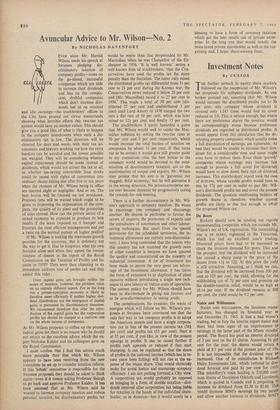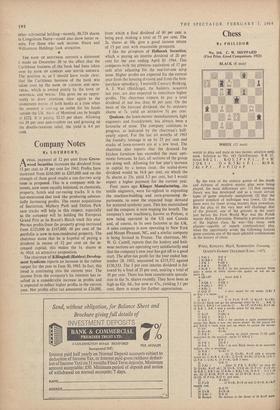Investment Notes
By CUSTOS
THE further setback in equity share markets followed on the reappraisal of Mr. Wilson's tax proposals for company dividends. As one broker pointed out, assuming that Mr. Wilson would increase the distributed profits tax to 30 per cent, any company whose dividend is covered only 1.245 times would find its cover reduced to 1.0. This is serious enough, but where there are preference shares the position would be correspondingly worse because preference dividends are regarded as distributed profits. It would appear from this calculation that the de- veloping property companies, which usually make a full distribution of earnings, are vulnerable. At best they would be unable to increase their divi- dends for a considerable time and some might even have to reduce them. Even those 'growth' companies whose earnings may increase fast enough to provide a full cover for dividends would have to slow down their rate of dividend increases. This stockbrokers' report took the case of BUTLINS, whose taxable profits would have to rise by 171 per cent in order to pay Mr. Wil- son's distributed profits tax and cover the present dividends. The question confronting holders of growth shares is, therefore, whether current profits are likely to rise fast enough to offset the proposed Wilson tax.
De Beers
Brokers should now be sending out reports recommending companies which are outside Mr. Wilson's net of UK registration. The outstanding one is DE BEERS, registered in the Transvaal, which has had an excellent year's trading. Diamond prices have had to be increased to check the insistent demand for gems. This and the prospect that the dividend will be increased has caused a sharp jump in the price of the shares from 111 to 121. At this price the yield is still attractive. Assuming, as I think we can, that the dividend will be increased from 300 per cent to 325 per cent, the yield, allowing for the withholding tax of 7f per cent and grossing up the double-taxation relief, would be as high as 10.14 per cent. If the dividend remains at 300 per cent, the yield would be 9.2 per cent.
Nairn and Williamson
NAIRN AND WILLIAMSON, the linoleum manu- facturers, has changed its financial year to end December 31, 1963. It had a bad winter's trading, but in July the interim report stated that there had been signs of an improvement in earnings in the latter part of the fifteen months' period. The Board has paid an interim dividend of 3 per cent on the El shares. Assuming 84 peri cent for the year, the shares would return al yield of 8.7 per cent at the present price of 19s.' It is not impossible that the dividend may be increased. One of its subsidiaries is Michael Nairn Investments Ltd., which bettered its divi-'• dead forecast and paid 8+ per cent for 1963. This subsidiary's main holding is 210,000 com-, mon shares of Dominion Oilcloth and LinoleuM, Which is quoted in Canada and is proposing to increase its dividend from $1.30 to $1.60. This would increase MNI's earnings by two points and allow another increase in dividends. MNI's
other substantial holding—namely, 86.724 shares in Congoleum Nairn—could also show better re- sults. For those who seek income, Nairn and Williamson Holdings look attractive.
THE BANK OF MONTREAL corrects a statement 1 made on December 20 to the effect that the Caribbean business of the bank had been taken over by BANK OF LONDON AND SOUTH AMERICA. The position is, as I should have made clear, that the Caribbean business of the bank was taken over by the BANK OF LONDON AND MON- TREAL, Which is owned jointly by the BANK OF MONTREAL and 'BOLSA; This gives me an oppor- tunity to draw attention once again to the Investment merits of both banks at a time when the investor is seeking an outlet for his funds outside the UK Bank of Montreal can be bought it £221. It is paying $2.15 per share. Allowing tor 10 per cent non-resident tax and grossing up the double-taxation relief, the yield is 4.4 per cent.







































 Previous page
Previous page